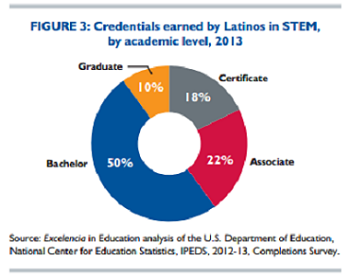

More Latinos are earning degrees in science, technology, engineering and math fields; yet more are needed, a new report by Excelencia in Education claims.
According to the study, “Finding Your Workforce: Latinos in Science, Technology, Engineering, and Math,” Latinos earning credentials in STEM increased to 9 percent in 2013 from 8 percent in 2010.
Bachelor’s degrees remain the most popular avenue through which Latino students are studying STEM, though they made up just 9 percent of all of those degrees awarded in 2013. Among the demographic group, certificate programs are gaining traction at an increase of 160 percent between the two years studied.
The research shows Latinos are getting their STEM credentials from a small number of institutions. In fact, 2 percent of institutions — or 91 — made up one-third of those granting related certificates, undergraduate, graduate and doctoral degrees to Latino students in 2013. The majority of the top 25 awarding bachelor’s degrees were Hispanic-serving institutions — colleges and universities where Hispanics make up 25 percent of the student body.
Among institutions educating Latinos at the certificate level, Puerto Rico’s Instituto de Banca y Comercio Inc., a for-profit two-year college, ranked the highest. South Texas College was at the top for granting associate degrees, and the University of Puerto Rico–Mayaguez was listed first under the bachelor’s degree category. Universidad Politécnica de Puerto Rico and Stanford University were the top master’s and doctoral degree-granters, respectively.
Microsoft Worldwide Corporate Vice President and Deputy General Counsel Horacio Gutierrez said in a news release accompanying the report:
“While it is promising that the number of Latinos earning STEM credentials has significantly increased since 2010, the report makes clear (and Microsoft agrees) that more needs to be done for Latinos to earn a higher proportion of total STEM degrees and be equipped for the higher-wage jobs of the 21st century.”
In an interview with NBC News, Gutierrez said the underrepresentation of Latinos in STEM is “severe.”
The news outlet reports that according to the U.S. Census Bureau, while Latinos account for 17 percent of the U.S. population, they made up just 6.5 percent of the STEM workforce in 2011.
Latinos in the STEM workforce are more likely to be employed in lower-paying service positions, the Excelencia report concluded. Five percent work as electrical engineers, compared with 23 percent who are in occupations such as electrical assembling.
After polling schools on the list of top colleges graduating Latinos, Excelencia found particular models that work well for recruiting and retaining Latino students in STEM. Among them:
- Policies that enhance K-12 STEM competency
- Outreach to students throughout the educational pipeline
- Partnerships between community colleges and surrounding universities, which allow students to transfer and continue their education
- Peer-mentorship programs
- Undergraduate research and fellowship opportunities
- Efforts to align training to specific skills to industry demands
